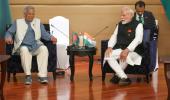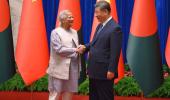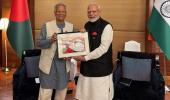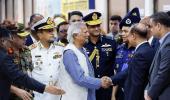India has withdrawn the transshipment facility it extended to Bangladesh for exports to the Middle East, Europe and various other countries through its ports and airports amid increasing strain in bilateral ties.

The move came days after head of Dhaka's interim government Muhammad Yunus made a controversial statement in China saying India's northeastern states, which share a nearly 1,600-km border with Bangladesh, are "landlocked" and have no way to reach the ocean except through his country.
India has exempted Bangladeshi exports to Nepal and Bhutan as such trade facilitation is mandatory for landlocked countries under the framework of provisions of the World Trade Organisation (WTO).
India and Bangladesh entered into the transshipment arrangement in 2020 and the facility was formally extended for Bangladeshi exports in 2022.
"The trans-shipment facility extended to Bangladesh had over a period of time resulted in significant congestion at our airports and ports," External Affairs Ministry spokesperson Randhir Jaiswal said.
"Logistical delays and higher costs were hindering our own exports and creating backlogs," he said.
Jaiswal said the transshipment facility has been withdrawn with effect from April 8.
Bangladesh has been using several Indian ports and airports including the Delhi airport for sending its exports to the Middle East, Europe and many other countries.
"To clarify, these measures do not impact Bangladesh exports to Nepal or Bhutan transiting through Indian territory," Jaiswal said at his weekly media briefing.
In an address at a business event in China recently, Yunus said the seven northeastern states of India are a landlocked region and they have no way to reach the ocean except through Bangladesh.
In a notification, the Central Board of Indirect Taxes and Customs (CBIC) withdrew the transshipment facility extended to Bangladesh.
On April 4, Yunus and Prime Minister Narendra Modi held talks in Bangkok on the sidelines of the BIMSTEC summit .
However, the Indian side was upset over Dhaka's version of the meeting between Yunus and Modi, especially attacks on minorities and the extradition request for Hasina.
People familiar with the matter described the version as "mischievous and politically motivated", especially the aspects relating to attacks on minorities and Dhaka's request for extraditing former premier Sheikh Hasina.
Yunus' press secretary Shafiqul Alam, in a Facebook post, on Saturday said the chief adviser raised with Modi Bangladesh's request for the extradition of Hasina and the "response was not negative".
The characterisation of the Indian prime minister's remarks regarding the relationship with Yunus and the previous Bangladesh government were "inaccurate", the people said.
New Delhi has not responded so far to the request made by Bangladesh's interim government last year for the extradition of Hasina.
India-Bangladesh relations nosedived dramatically after Yunus failed to contain attacks on minorities, especially Hindus, in that country.
Hasina has been living in New Delhi since she fled Dhaka in August last year.
In the meeting in Bangkok on Friday, Modi conveyed to Yunus India's deep concerns about the safety of Hindus and other minorities in Bangladesh.
"The prime minister urged that rhetoric that vitiates the environment is best avoided," an Indian readout of the meeting said.
PM Modi underlined India's concerns related to the safety and security of minorities in Bangladesh, including Hindus, and expressed his expectation that the government of Bangladesh would ensure their security.
On Dhaka welcoming China to participate in Teesta river project, Jaiswal said India and Bangladesh share 54 rivers, which includes the Ganga and Teesta rivers.
"To discuss relevant issues, an institutional dialogue mechanism is in place called the 'Joint Rivers Commission'. Conversation could take place on matters mutually agreed upon, provided the overall environment is conducive," he said.











 © 2025
© 2025